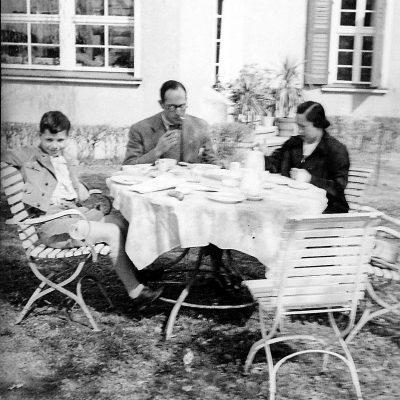Sergeant Richard Ferber’s (né Faerber) life was not without challenges. Born in 1895, he served in the German Army during World War I as a Financial Affairs Assistant. It was there, on April 26, 1918, he earned an Eisernes Kreuz 2. Klasse, or Iron Cross 2nd Class, for distinguished service.
Richard went on to marry Margot Lewkowitz, with whom he welcomed son Heinz-Walter Ferber in 1925. The Ferber family lived and worked in Berlin during the rise of the Nazi party.


With tensions rising and anti-Jewish laws growing increasingly oppressive, Richard’s career as a stockbroker with the Berlin Stock Exchange came to an abrupt halt following a 1935 addendum to stock exchange regulations that forbade Jews from serving in state-owned organizations. To contest this exclusion, he wrote appeals to the Berlin Stock Exchange Commissioners, the President of the Berlin Stock Exchange, and the German Minister of Economy. Though he was granted the status of individual broker on July 30, 1936, any success he found was short lived: this agreement was repealed by decree of the Labor Secretary on June 28, 1938, which removed all Jews from the Berlin Stock Exchange.
Tensions continued to rise throughout Germany and its occupied territories. Deprived of the ability to earn a living and having exhausted all efforts to change this, Richard and Margot planned their escape from persecution by way of the SS Orinoco. In September 1938 they began their journey to the United States via Cuba, a mere two months before the devastation of Kristallnacht. Violence erupted, synagogues, homes and businesses were vandalized and tens of thousands of Jewish men were deported to the Dachau, Buchenwald and Sachsenhausen concentration camps during “the Night of Broken Glass,” also known as Kristallnacht, from November 9 to 10, 1938.


The SS Orinoco would later join her sister vessel the MS St. Louis in attempting to carry Jewish refugees to safety and being rejected from various ports. Unlike the Ferber family, the passengers on the 1939 voyage, would not be accepted into Cuba and their fate remains unknown.
Shortly before the family’s departure from Cuba, Richard’s son Walter wrote a Father’s Day poem illuminating his wish for his father to receive a visa and a good job.

The poem translates in English as: On Father’s Day. Although Father’s Day is a modern discovery I am sure that you like it very much. So on this newly invented day of celebration I congratulate you very much. I wish that very soon your visa will be available to you and that you, my dear “Pop” will soon obtain a good job. It is also high time that the President (long may he live) announces that he is ready to institute for us a Father’s Day. Because I must thank you very much for all that you have done and much more, and for all that you have given me I say: “Long shall my daddy live.” Your son Heinz – Israel – Walter
Having remained in Havana for a short time, the Ferber family arrived in the United States in 1940. The family settled in New York, where Richard held various positions as a machinist. Having endured persecution and antisemitism, forcible termination and emigration, Richard applied for Restitution in 1945. In 1946 he applied for employment at the New York Stock Exchange, listing suspension on “account of my race and religion” in the employment history. Though we do not know if he obtained a job at the NYSE, it speaks to the spirit of survival that he had the opportunity to apply.